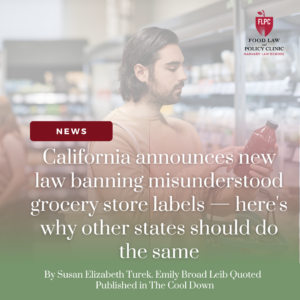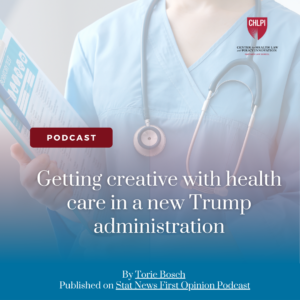Originally published by Waste Today Magazine on July 17, 2019. Written by Theresa Cottom.
Harvard Food Law and Policy Clinic (FLPC), based in Cambridge, Massachusetts, and the Center for EcoTechnology (CET), a nonprofit environmental consultant for businesses based in Pittsfield, Massachusetts, have released a new toolkit on state and local organic waste bans.
Bans and Beyond: Designing and Implementing Organic Waste Bans and Mandatory Organics Recycling Laws serves as a resource for state and local policymakers, regulators and advocates interested in policy solutions to reduce food waste and keep food out of landfills.
Bans and Beyond examines the legal landscape of existing state and local organic waste bans. This landscape is constantly evolving: six states and seven municipalities across the country have now passed organic waste bans, and three of these policies passed within the last year. The toolkit analyzes the structure of these different policies and the challenges that jurisdictions have faced in implementing them—for example, challenges with accessing funding, developing effective enforcement mechanisms and building sufficient organics recycling infrastructure.
The toolkit also analyzes nine additional sets of policies and programs that can be implemented to incentivize waste reduction. These policies are essential to creating an environment where organic waste bans can succeed and can also be effective policy tools to reduce food waste in states where an organic waste ban or recycling mandate may not be feasible, FLPC says.
For example, states and localities can provide grant funding for food waste reduction, recovery and recycling programs; revise permitting and zoning regulations to facilitate the development of composting facilities and anaerobic digesters; and implement pay-as-you-throw systems that charge residents based on the amount of waste they throw out in order to encourage residents to reduce their waste disposal and increase recycling and composting.
This toolkit builds on other resources FLPC has produced to support states and localities in addressing food waste through policy. FLPC’s 2016 toolkit, Keeping Food Out of the Landfill, offers an array of policy suggestions for reducing food waste, from strengthening food donation liability protections to implementing organic waste bans. The most recent toolkit builds on that with much more detail about organic waste bans.
In recent years, state and local governments have explored policies to reduce the 40 percent of food in the U.S. that goes to waste. Organic waste bans are one of the most innovative categories of policies, FLPC says in a news release. By restricting the amount of food waste that businesses and individuals can dispose of in landfills, organic waste bans can drive adoption of more sustainable practices.
FLPC says cost-benefit analyses have shown the potential of organic waste bans to reduce greenhouse gas emissions while stimulating local economies and creating green jobs. In Massachusetts, the state’s organic waste ban supported over 900 jobs in the organic waste hauling, processing and food rescue industries in 2016 and generated $175 million in industry activity.


Health Law & Policy, Commentary
Addressing The HIPAA Blind Spot For Crisis Pregnancy Centers
November 18, 2024